We have Top-Rated Dog Training Experts in India
As dog parents, we know how vital it is to find the right trainer for our pets. In India, dog training services are becoming more popular. This shows how important professional dog training is. We will look at the best dog trainers who use new methods for different dog types and behaviors.
These experts help dogs behave better with fun and structured training. We aim to help you choose the best for your pet. Let's explore the exciting world of dog training in India together. Here, dogs and their owners can grow and support each other.



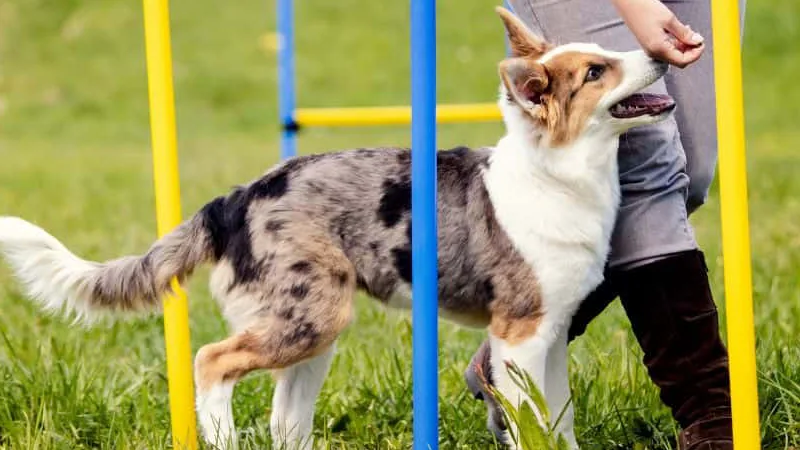
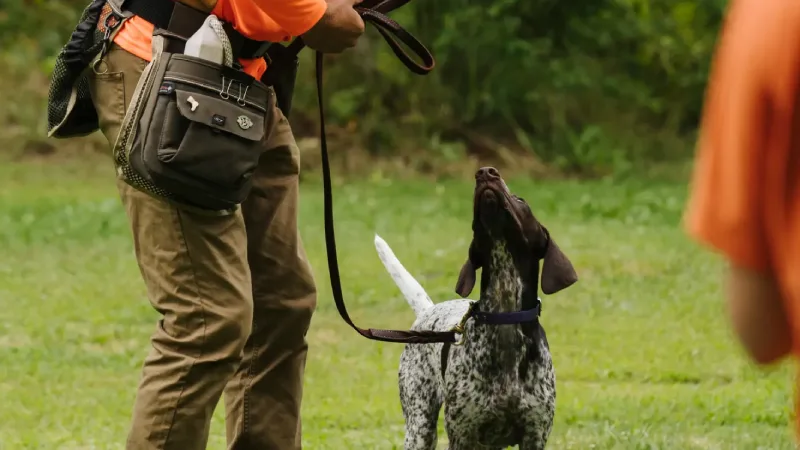
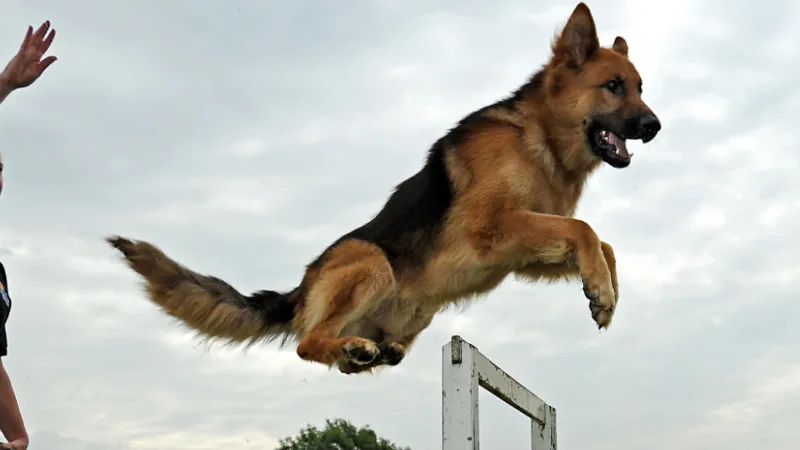
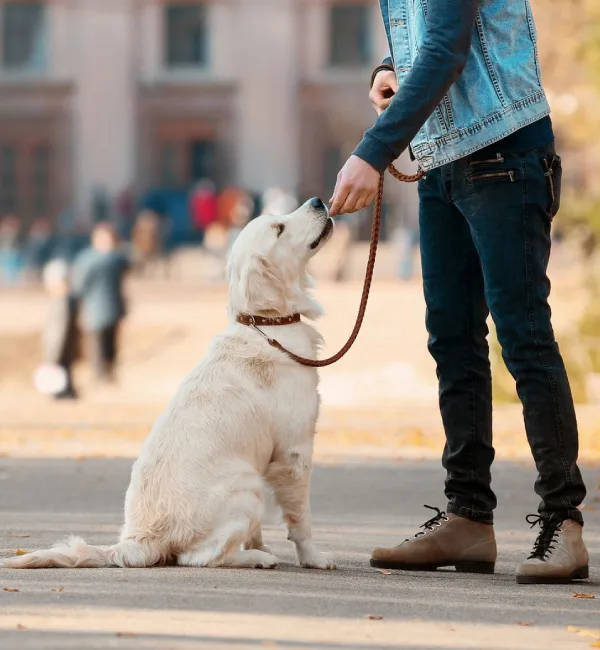
Understanding Dog Training in India
Dog training in India is shaped by different views on pets. Many owners struggle with problems like barking and destructive behavior. About 70% face these issues, showing the need for good training.
There are old and new ways to train dogs. Old methods use strict commands. New ones focus on trust and talking to your dog. Classes help owners learn these methods, creating a better bond with their dogs.
- Obedience Training: Essential for instilling basic commands and appropriate behavior.
- Service Dog Training: Equipping dogs to assist individuals with disabilities.
- Behavior Modification: Addressing specific issues such as anxiety and aggression.
The pet training business in India is booming. It's expected to grow by 24% each year for the next five years. With over 1,000 providers, training costs range from ₹6,000 to ₹15,000 monthly.
Here's a table showing key dog training facts in India:
| Training Type | Duration | Average Cost | Common Issues Addressed | Popularity Rating |
|---|---|---|---|---|
| Obedience Training | 3 Days (1 hour/session) | ₹6,000 | Excessive Barking, Nipping | 3.7 to 4.7/5 |
| Service Dog Training | Varies by need | ₹6,000 | Support for Disabilities | 3.5 to 4.5/5 |
| Behavior Modification | Weeks; varies by dog | Up to ₹16,000 | Fear, Aggression | 4 to 4.8/5 |
The Importance of Professional Dog Training
Professional dog training can make our bond with our dogs stronger. By choosing a dog training center near me, we gain many benefits. These benefits make our homes happier and safer.
A well-trained dog is more obedient, which is key for safety. Basic commands can be learned in a few weeks with regular practice. Training sessions of 10 to 15 minutes fit well into our busy lives and meet our dogs' needs.
- Professional trainers create tailored plans to address specific behavioral challenges.
- Early socialization of puppies, facilitated through structured training, can prevent future behavioral problems.
- The use of positive reinforcement has proven effective in modifying undesirable behaviors in up to 80% of cases.
For 30-40% of dog owners, expert help is essential for stubborn or complex behaviors. Immediate rewards or corrections speed up learning. Motivated dogs learn faster, showing how important it is to know each dog's unique needs.
Professional dog training in India strengthens our bond with our pets. It leads to better behavior and enriches our daily lives. Finding a dog training center near me can change our relationship with our dogs for the better.
| Benefit | Description |
|---|---|
| Improved Obedience | Dogs learn commands, leading to a safer environment. |
| Behavior Modification | Professional trainers use positive reinforcement for effective behavior change. |
| Enhanced Social Skills | Early exposure and socialization prevent future behavioral issues. |
| Custom Training Plans | Trainers tailor strategies to meet the specific needs of each dog. |
Top-Rated Dog Training Services in India
In India, there are many dog training services for our pets. They help strengthen the bond between dogs and their owners. With 80 experienced trainers, we can find the perfect fit for our pets.
Let's look at what some top-rated places offer.
Overview of Services Provided
Leading dog training services have many programs. They include:
- Obedience classes
- Puppy potty training
- Canine behavior modification
- Personalized boarding and training
- Social training for city dogs
- Various activities including leash walks, fetch games, treadmill workouts, hikes, and treks
Specialized Training Programs Available
For specific training needs, specialized programs are key. Many services offer:
- Competitive training for breed shows and obedience contests
- Protection skills training, improving dogs' natural abilities
- Narcotics and explosives search training
- Security dog training by Sicherheit Kennels, known for its specialization
These programs have helped over 550 happy clients and 820 successful events. Greenfield Kennels, covering 12 acres, provides a great space for training.
Dog Behavior Modification Techniques
Understanding dog behavior modification is key to changing dogs with tough behaviors. Techniques like desensitization and counterconditioning are very helpful. They change how a dog feels about certain things, like strangers or loud noises.
Desensitization slowly gets a dog used to things they fear. For example, if a dog is scared of strangers, we start by letting them see them from far away. Then, we slowly get closer as they get more comfortable.
Counterconditioning is used with desensitization. We add something good, like treats, when they see something they fear. This helps a dog feel happy instead of scared. Our trainers have seen great results with these methods in aggressive dog training.
| Techniques | Description | Real-Life Application |
|---|---|---|
| Desensitization | Gradual exposure to fear triggers in a controlled way. | A dog showing aggression towards other dogs can start by observing them from a distance. |
| Counterconditioning | Pairing fear-inducing stimuli with positive experiences. | A dog is rewarded with treats upon seeing a stranger instead of reacting aggressively. |
| Positive Reinforcement | Encouraging desired behaviors through rewards. | Implementing a treat system to reward calm behavior around other pets. |
| Training Consistency | Regular short training sessions yield better results. | Daily practice sessions of at least 30 minutes to reinforce learned behaviors. |
Knowing the cost of dogs in India helps you make better choices. It also helps you plan for their care over time. With the right information, we can give our new friends a happy home.
Group Classes vs. Private Sessions
Choosing between group classes and private sessions is a big decision for dog training. Each option has its own benefits for different dog owners and their pets.
Group classes are cheaper, making them a favorite choice. They let dogs learn with others. Classes cover basic obedience and special topics like puppy socialization and agility.
These settings help dogs get better at socializing. They meet and play with other dogs, which is great for their social skills.
Private sessions offer one-on-one attention. They're perfect for dogs with special needs like aggression or anxiety. Even though they cost more, they can solve problems faster.
Private sessions are key for dogs with high energy or separation anxiety. They get the help they need in a focused way.
Many things affect our choice between group classes and private sessions. Our dog's personality, what we want to achieve, and our own preferences matter. For example, busy owners might like in-home training. This is a growing trend in pet training.
In the end, both group classes and private sessions are good. Group classes are affordable and help with social skills. Private sessions offer customized training. Knowing what each offers helps us choose the best for our dog's training.
The Benefits of Positive Reinforcement Training
Positive reinforcement training is a great way to teach dogs new things. It rewards them for good actions. This method is kind and works well. Many people use treats or praise to help their dogs learn and build trust.
How Positive Reinforcement Works
This method rewards good behavior right away. It makes dogs think positive thoughts. Key parts of positive reinforcement include:
- Teaching that fits different learning styles, for all dogs and ages.
- Less stress and anxiety, making training fun for pets and owners.
- Encouraging clear communication, improving the bond between dogs and owners.
Studies show positive reinforcement can improve obedience by 70%. Dogs trained early remember commands 90% better than others. Starting training at eight weeks old helps puppies behave well and avoid bad habits.

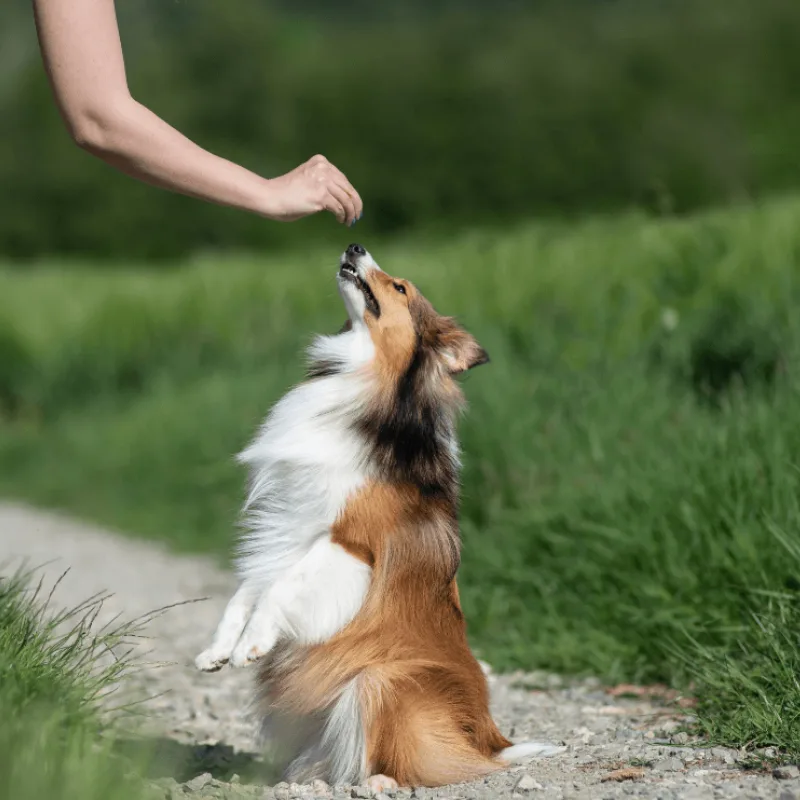
Success Stories from Happy Pet Owners
Many pet owners have great stories about positive reinforcement training. Some highlights are:
- 60% less bad behavior like barking and jumping.
- 80% of dogs feel less anxious after training.
- Over 70% of owners say their bond with their pet got stronger.
Group dog classes are also popular. They help dogs learn social skills and are affordable. Owners find it helpful to learn from others too.
| Benefit | Statistic |
|---|---|
| Improvement in obedience | 70% with positive reinforcement |
| Reduction in stress indicators | 50% during training |
| Increase in confidence | 80% of dogs |
| Improvement in owner engagement | 75% during training |
| Retention rate for learned commands | 90% vs. 50% for punishment methods |
These stories show how positive reinforcement training changes dogs and their owners. It brings immediate and lasting benefits, making pets happier and better behaved.
Puppy Training Programs for New Owners
Getting a puppy is exciting but also a big responsibility. Puppy training programs are key for new owners. They teach essential skills and basic commands.
Our puppy training program focuses on important skills like potty training. This is vital for a puppy's early development.
Puppies learn best when they try new things early on. Start with simple commands like "heel," "down," and "leave it." These commands help us communicate better with our dogs and build a respectful bond.
- Socialization: Introduce puppies to other dogs and people to help them adapt and feel less anxious.
- Basic Obedience: Teach commands to bring structure and discipline to our training.
- Leash Training: It's important for fun walks and outings.
Our program covers 24 topics on dog training, behavior, health, and management. It teaches how to fix common problems like jumping and biting. This ensures our pets behave well as they grow.
Training at home is also vital. Our program helps the whole family get involved in training. This makes training more effective and brings positive changes.
| Element of Training | Description |
|---|---|
| Course Duration | 21 days |
| Total Seats Available | 10 |
| Commencement Schedule | First week of every month |
| Specialized Areas | Guard training, Sniffing, Show training, Tracking |
Teaching dogs to understand us is key. We focus on voice and gestures. Good communication skills are essential for working with our pets.
Our puppy training programs create a supportive environment. Puppies learn and grow, becoming more confident and social. This makes training rewarding for both us and our dogs.
Our programs use science and positive methods to teach. This approach helps puppies thrive and prepares us for responsible pet ownership. It builds a strong bond with our furry friends.
Aggressive Dog Training Strategies
Training aggressive dogs needs a deep understanding of what makes them act out. We must find out what makes them angry. This helps us teach them in a way that fits their needs.
Identifying Aggression Triggers
Figuring out what makes a dog angry takes watching them closely. Things that might upset them include:
- Strangers approaching the dog
- Other animals, specially in play settings
- Noisy places that scare the dog
- Being touched in sensitive areas
Knowing what makes them angry helps us train them safely. We need to watch for patterns in their behavior. This helps stop their anger from getting worse.
Training Approaches for Aggressive Dogs
Choosing the right training methods is key for aggressive dogs. There are many ways to train, depending on the dog's behavior. Some methods are:
- Desensitization: Slowly getting the dog used to what scares them
- Counter-conditioning: Making good things happen when they're scared
- Positive reinforcement: Rewarding them for calm behavior
By finding out what makes them angry and using the right training, we can help aggressive dogs. This improves their life a lot.
The Role of Dog Psychology in Training
Understanding canine psychology is key to good dog training. It helps us tackle specific behaviors and connect with our dogs better. Experts use this knowledge to improve training, making it more effective.
Professional dog training uses many psychological principles. Operant conditioning is the most common. It uses rewards to encourage good behavior, leading to better results. Studies show reward-based training works up to 80% of the time, proving its worth.
We also tailor training for different breeds. Beagles and Jack Russells need special plans for their minds. Customized training makes learning better, fitting each breed's needs.
Exploring canine psychology helps us understand our dogs better. We learn about their motivations and fears. This knowledge strengthens our bond and makes training more effective.
Selecting the Right Dog Training Expert
Finding the perfect dog trainer is key for a great training experience. With many options in India, we need to choose wisely. Let's look at what to focus on when picking a trainer.
What to Look For in a Trainer
When looking for dog training services, remember a few important things. These will help us find a skilled trainer:
- Qualifications: Check if the trainer has certifications and lots of experience. A good trainer will have recognized certifications.
- Training Philosophy: Make sure their training style matches our values. Good trainers use positive methods to teach good behavior.
- Custom Programs: A great trainer will create special programs for our dog. They'll consider our dog's breed, age, and any special needs.
- Involvement of Owners: A good trainer will involve us in the training. They should explain their methods clearly.
- Recommendations: Ask friends, vets, or online groups for trainer recommendations.
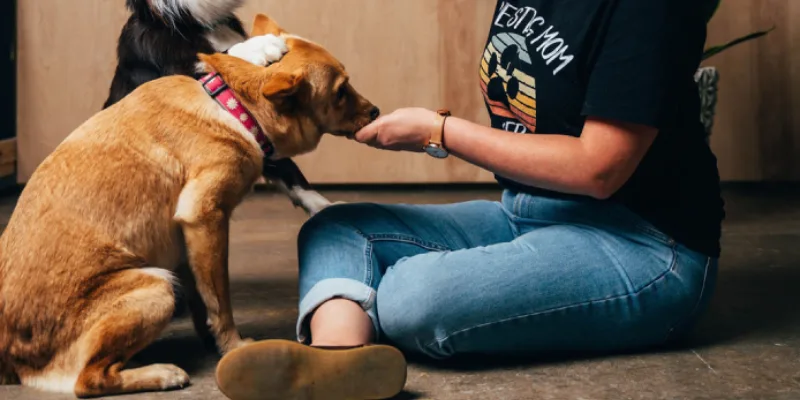
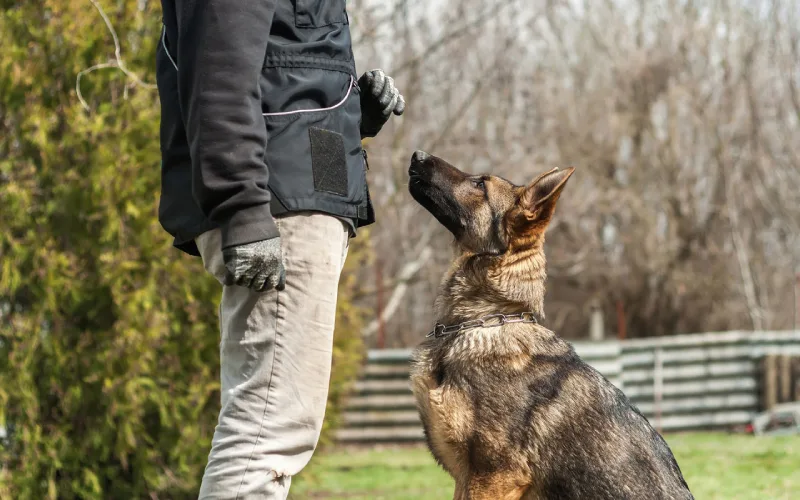
Questions to Ask in Consultations
Before starting training, ask these questions in consultations. They help us see if the trainer is right for us:
- What is your training philosophy and approach?
- Can you share success stories or testimonials from past clients?
- How many sessions do you suggest for my dog, and what happens in each session?
- Do you offer online training or only in-person sessions?
- What methods do you use for changing bad behaviors like aggression or anxiety?
With the right help and these tips, we can pick a great trainer. We have over 300 certified trainers makes it easy to find qualified ones.
Community Support and Resources for Dog Parents
Being a dog parent can be tough, but we're lucky to have help. Connecting with other dog owners is key. It helps us learn and feel supported during tough times.
There are many local and online resources for dog parents. Workshops, support groups, and events are great for meeting others. We can share tips and learn new things. This helps us train our dogs better and bond with them more.
The “YOUR Perfect Puppy” course is a top choice for new puppy parents. It lasts for 4 weeks and offers six months. It's helped hundreds of parents improve their skills.
| Resource | Duration | Benefits |
|---|---|---|
| YOUR Perfect Puppy Course | 4 weeks | 6 months of Playtime |
| 14 Days to a Stronger Recall | 14 days | Improved dog recall skills |
| 14 Days to a Stronger Leave It | 14 days | Enhanced impulse control |
There are also free resources like a 45-minute video session with “YOUR Perfect Puppy.” It offers personalized help. By joining local events or online webinars, we can keep improving.
Community support is very important. It helps us deal with common problems like behavior issues. With the right resources, we can keep our dogs happy and part of our families.
Exploring Alternatives: Online Dog Training Options
The rise of online dog training programs is changing how we teach our pets. Now, we can train our dogs from home with many services in India online. This is great for those who can't find local trainers or like learning online better.
Online dog training has many benefits. We get to use cool tools like clickers and treats. These help us teach our dogs new things. For example, using a leash that's 4 to 6 feet long helps us communicate better.
Online training is also very flexible. We can find classes that fit our dogs' needs, like stopping bad behaviors or learning new tricks. Experts say positive rewards are key to good training. This makes learning fun and rewarding for our dogs.
Online programs teach us how to stop bad behaviors too. We learn tricks like walking nicely on a leash. This is all done from home, making it easy and convenient.
There are many special training options available. For example, Rohini helps dogs with aggression, and Tanya Patel uses games instead of treats. This lets us pick what's best for our dogs.
Ending training sessions on a good note is important. It helps our dogs learn more and do better next time. Online training makes it easy to improve our dogs' skills and bond with them at home.
Choosing the right dog training services in India is key for a good bond with our dogs. We've learned how professional training and behavior techniques help a lot. The best trainers can really change our pets for the better.
Dog training is all about being consistent and patient. Using crate training and basic obedience helps our dogs learn and socialize. This makes them great friends for life, whether they're puppies or adult dogs.
So, let's move forward with our dogs' training. Looking for experienced trainers and joining programs is important. It helps our pets grow and thrive. For help or to talk about dog training in India, call us at 8766330856.